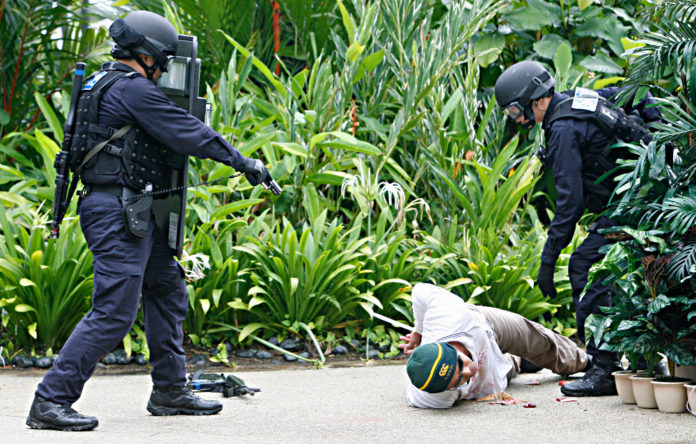SINCE Islamic State-inspired militants laid siege to the southern Philippine city of Marawi earlier this year, the terrorism threat to Southeast Asia has reached its highest level since the turn of the century.
The dual risk of online radicalisation inspiring home-grown jihadis, alongside IS fighters returning from Marawi, Syria and Iraq to launch attacks on their native countries, has provoked widespread concern in Southeast Asia’s two largest Muslim-majority states, Indonesia and Malaysia.
Yet the wealthy city-state of Singapore – nestled between its two larger neighbours – is also on a state of heightened alert. Despite a series of Islamic State attacks which have slipped through the net across the region in the last two years, Singapore has so-far avoided suffering the same fate.
SEE ALSO: On social media, Islamic State uses fantastical propaganda to recruit members
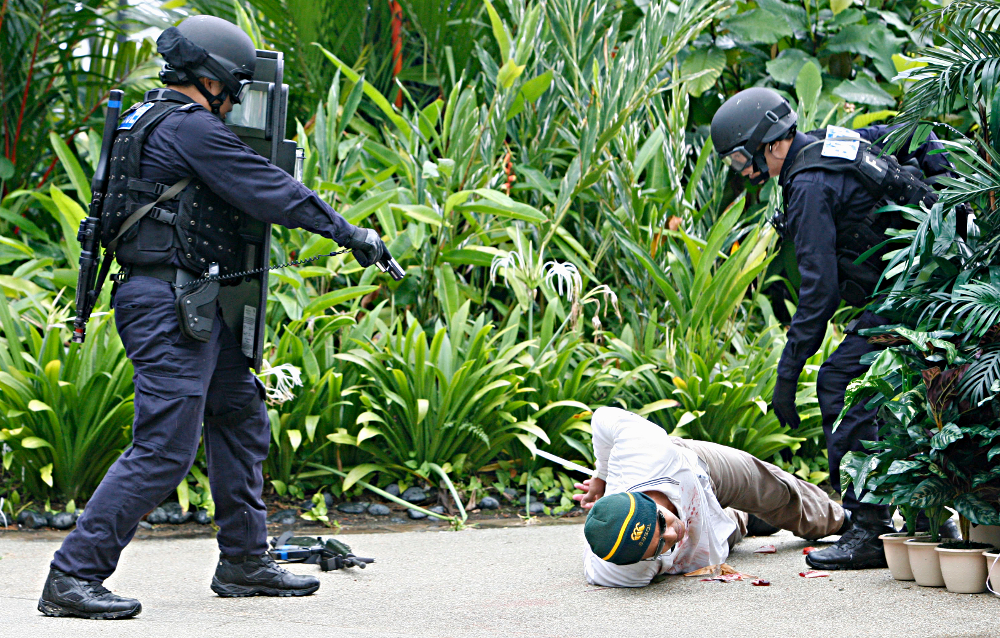
Singapore police officers arrest a mock terrorist during a terrorism exercise in Singapore. Source: AP
Singapore’s military and law enforcement authorities have staged a series of high-profile counter-terror drills in recent months, and have announced the deployment of rapid-reaction teams over the holiday period to reassure the public. But just how prepared is Singapore to combat the threat?
In June, the government released its first annual Terrorism Threat Assessment Report. It confirmed the terror threat to Singapore is at its ‘‘highest level in recent years’’ given the widening global reach of the Islamic State group; especially in light of its brazen attempt to branch out into Southeast Asia.
SEE ALSO: Philippines: Foreigners in leading militant roles in besieged Marawi
The report highlighted the risk of fighters returning from Marawi, and noted the increasing number of terror arrests and disrupted Islamist plots across the region. Malaysian police disrupted seven plots and made 119 arrests last year, in comparison to just four plots and 85 arrests in 2015. Indonesian authorities disrupted 15 plots and arrested 150 militants, compared to only nine plots and 65 arrests the previous year. The figures suggest a sharp rise in regional militant activity.
Meanwhile in September, IS’s Al-Hayat media centre released a propaganda video featuring a Singaporean jihadist based in Syria – Megat Shahdan Abdul Samad – urging jihadist sympathisers in Southeast Asia to join the struggle in Marawi or launch attacks in their home countries. The video raised alarm in Singapore, acting as evidence that the city-state is now firmly in the sights of extremists.
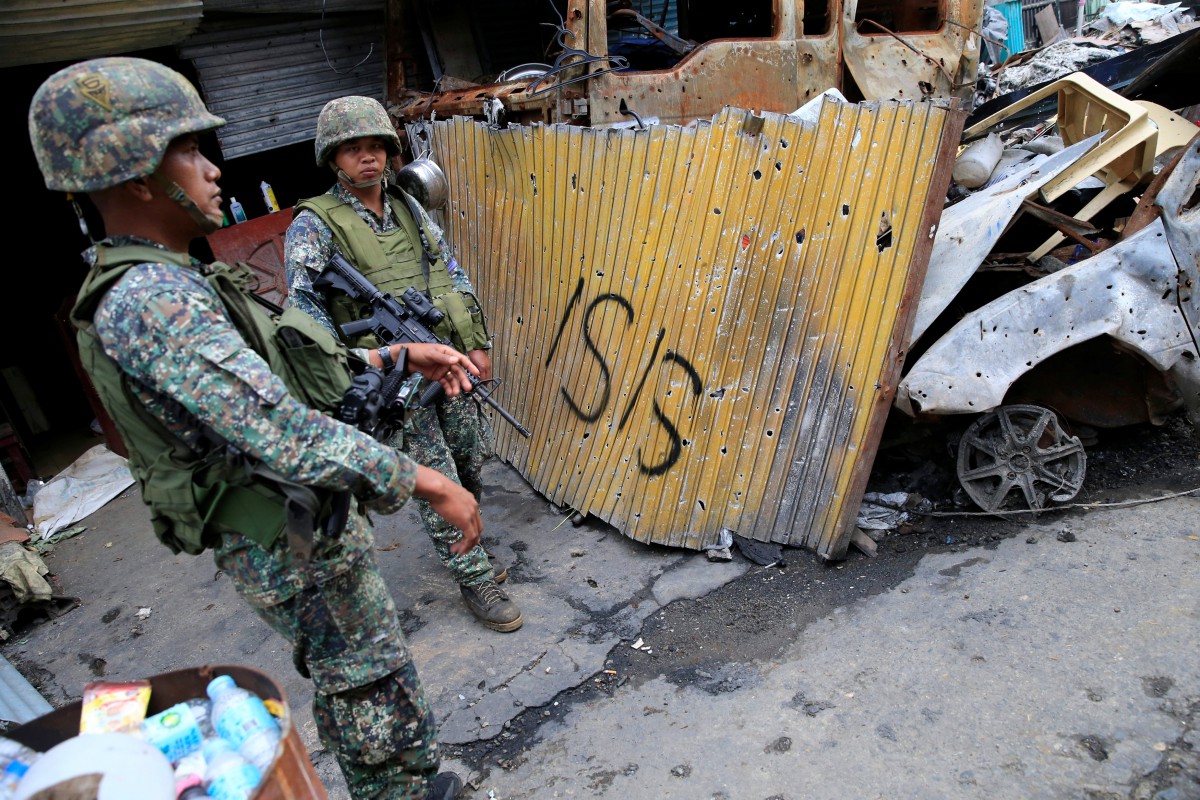
Government soldiers stand on guard in front of damaged buildings as troops continue their assault on its 105th day of clearing operations against pro-IS militants who have seized control of large parts of Marawi City, Philippines, on Sept 4, 2017. Source: Reuters/Romeo Ranoco
Singapore has in fact long been a target for Islamist terrorists, making it all the more remarkable that an attack has so far been avoided. Singapore’s role as a major global hub for aviation, finance, trade and tourism makes it a high-profile target for attention-grabbing transnational jihadi groups. In addition, Singapore is a close ally of the United States and is part of the international coalition taking on ISIS in Syria and Iraq. Several other coalition members – including the US, UK, France, Germany and Belgium – have all fallen victim to deadly terror attacks in recent years.Islamic State has already tried to target Singapore on at least two previous occasions. A plot targeting well-known landmarks was foiled by the authorities in the first half of 2016. Then in August last year, Indonesian security forces disrupted an ambitious plot by militants located across the Singapore Strait in Batam, to launch a rocket attack targeting the Marina Bay Sands resort.
What the authorities fear most however, is the threat of lone-wolf attacks perpetrated by radicalised individuals, using unsophisticated weapons such as knives or vehicles. This type of attack requires little planning and therefore is more difficult for intelligence agencies to prevent, posing a nightmare scenario for the security services.
SEE ALSO: Singapore: Eight Indonesian students deported for carrying Islamic State materials
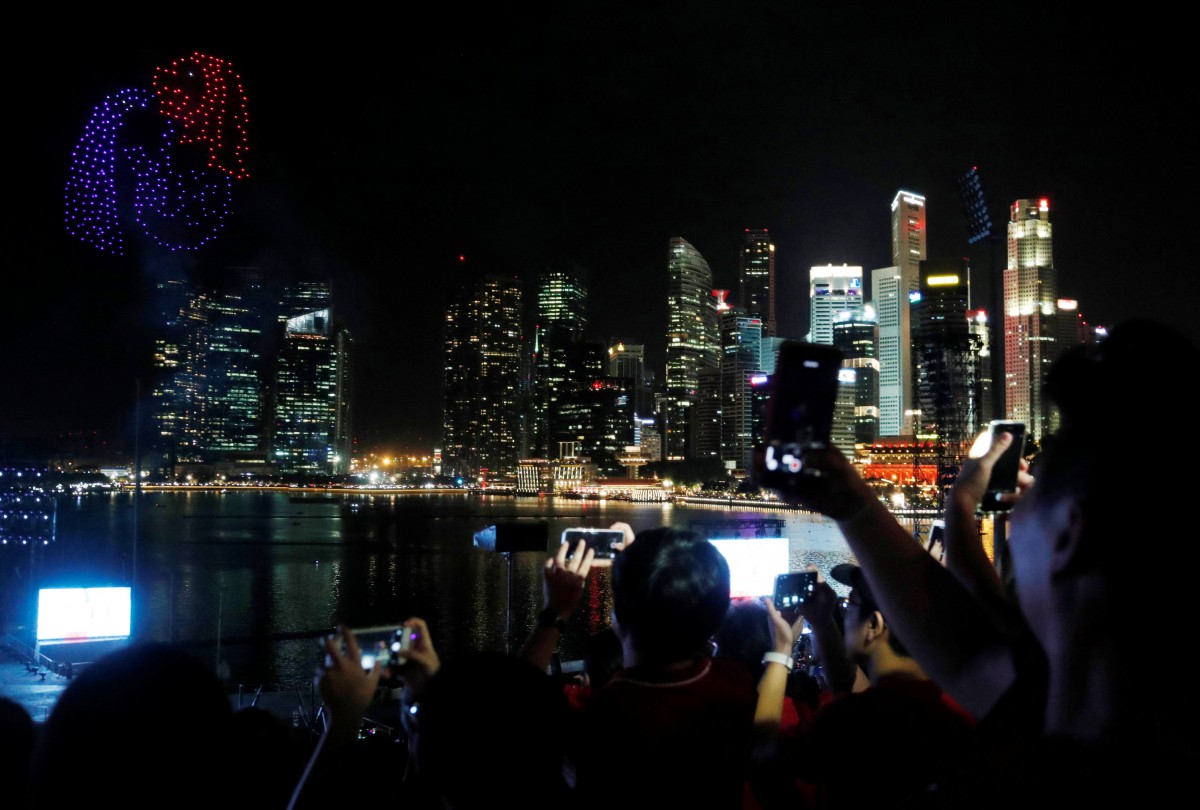
Source: Reuters/Edgar Su
In response to the threat, Singapore’s government has been proactive. Home Affairs Minister K Shanmugam has already announced a major revamp of the country’s counter-terrorism strategy, detailing new measures to be put in place over the next four years. Last year Mr Shanmugam described Singapore as ‘‘an oasis of calm’’ within the region, making it ‘‘a prime target’’ for terrorists. He added that ISIS poses ‘‘a far graver threat than Al-Qaeda’’ ever did in the 2000s.
As part of the new measures, CCTV coverage is set to expand across the city, with additional cameras being installed around government buildings, transport hubs, entertainment venues and shopping malls. CCTV data is also set to become more rapidly accessible to police, whilst the public has been encouraged to submit images and videos of suspicious activity to the authorities.
New construction laws and building regulations aim to enhance security around major tourist attractions and public areas with heavy footfall. In October, parliament passed the Infrastructure Protection Bill, requiring developers to add enhanced security measures at the design stage; whilst pre-existing buildings can now be forced to install high-tech CCTV systems and vehicle barriers.
Singapore’s police force has also upgraded its capabilities through the formation of new highly-trained Emergency Response Teams (ERTs), designed to arrive rapidly at the scene of an ongoing attack and quickly overpower the assailants. The officers that make-up these units are specially trained in urban assault skills, and will have access to greater firepower than regular recruits.
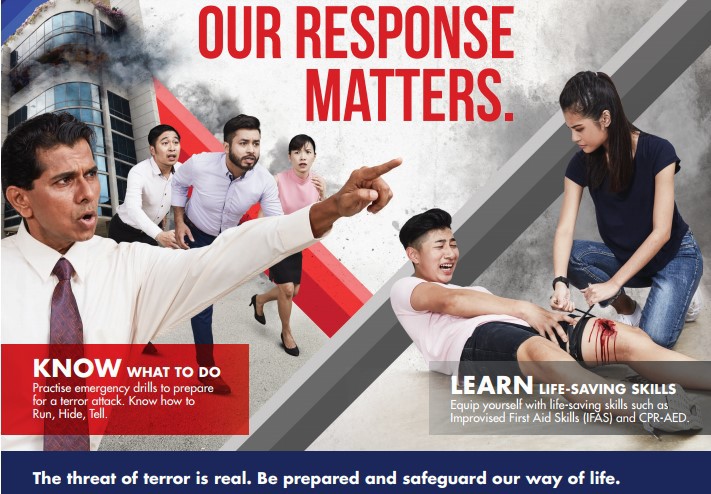
A Singapore government poster urges citizens to prepare to respond in case of a terror attack. Source: SG Secure
Singapore has also launched a large-scale public initiative – “SG Secure” – aimed at increasing threat awareness among the population and seeking to forge a collective response in the wake of an attack. The Home Affairs Minister, Mr Shanmugam, said the initiative would mobilise citizens to exercise continual vigilance, and help forge community resilience in the aftermath of an incident.
Since the new measures were first introduced, Singapore has continued its preparations through holding a succession of counter-terrorism drills. Most recently on Oct 17, a multi-agency drill was held at Changi Airport, as part of a large-scale annual anti-terrorism operation labelled Exercise Northstar. This year’s exercise tested responses to simulated vehicle, bomb and gun attacks in crowded public spaces, and involved more than 500 personnel from ten government agencies.
SEE ALSO: Singapore: Australia PM to focus on terrorism, North Korea at Asia Security summit
In addition to tightening domestic security, Singapore has also played a key role in enhancing regional co-operation. On 28 November, Singapore’s military leaders conducted a high-level meeting with their Indonesian counterparts to discuss responses to a range of possible scenarios. Earlier in December, a contingent of Singapore Armed Forces (SAF) soldiers completed a two-week urban warfare training exercise alongside Philippine troops, fresh from the battle in Marawi.
Defence Minister Ng Eng Hen has also pledged to forge greater counter-terrorism co-operation between all ten Asean states through the duration of Singapore’s 2018 Chairmanship of the regional bloc.
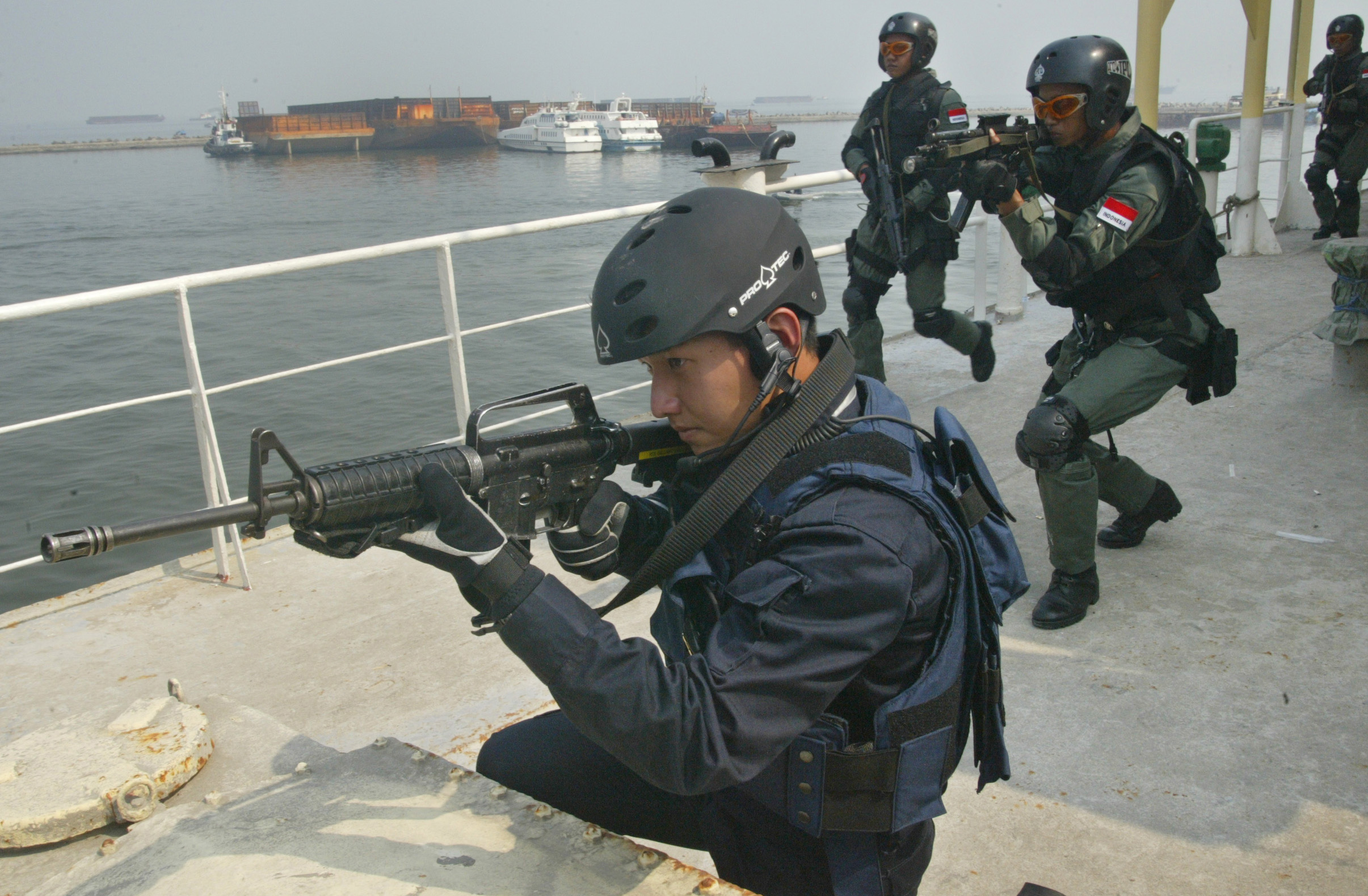
(File) Indonesian and Singaporean Navy commandos take their positions in a joint anti-piracy exercise. Source: AP
SEE ALSO: Ties between Southeast Asia and Bangladesh’s jihadis growing – report
The absence of a major attack in Singapore since Islamic State burst on to the global stage four years ago, shows that the counter-terrorism measures put in place have so-far worked effectively.
However, the current threat environment – in which the fear of online recruitment runs alongside the possibility of battle-hardened ISIS fighters returning to the region – means the risk is higher than ever before. Singapore’s leaders have said it is now likely a question of “when”, not “if”, an attack will take place. The threat from lone-wolves operating under-the-radar, making use of easily-obtainable weapons in spontaneous attacks which require little planning, is especially hard to prevent.
Yet given the extent and depth of its counter-terrorism strategy, Singapore has a higher chance of avoiding the type of large-scale mass-casualty attacks witnessed in other global cities. And amid an increasingly volatile regional climate, Singapore is arguably better-prepared than any other nation in Southeast Asia to respond effectively and quickly, should the worst-case scenario occur.
